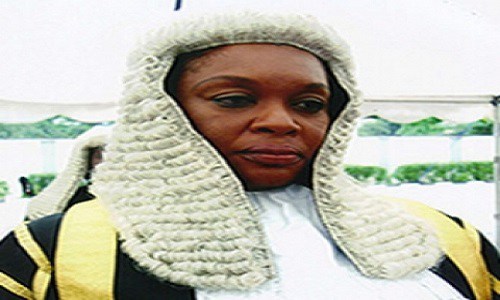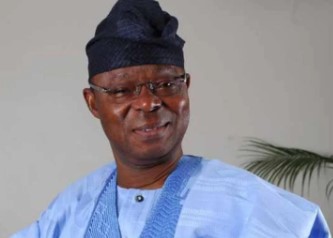Crime
Judicial Council official testifies against dollar-rich judge
Published
8 years agoon
By
Editor
An official of the National Judicial Council (NJC), on Friday told an Ikeja High Court that the salaries and allowances of judges are not paid in foreign currencies but in Naira.
Ramatu Ahmed said this while being led in evidence by Rotimi Oyedepo, an EFCC prosecutor, at the ongoing corruption trial of Rita Ofili-Ajumogobia, a Federal High Court judge, and Godwin Obla, a Senior Advocate of Nigeria .
Mrs Ofili-Ajumogobia faces a 27-count charge of unlawful enrichment, taking property by a public officer, corruption, forgery and giving false information to an official of the EFCC.
The NJC official, who was subpoenaed by the EFCC to testify as its 13th prosecution witness, responded to questions about the allegedly questionable foreign currency transactions in the bank accounts of the judge.
Mrs Ahmed identified Mrs Ofili-Ajumogobia as a customer to the Diamond Bank accounts, including a corporate account under the name Nigel and Colive, where deposits of $894,400 and N56.2 million were made.
“The allocation budget is routed through the NJC which is disbursed to the various courts.
“Though judges receive allowances such as estacodes other than their salaries, such allowances are disbursed through the individual courts. The judges receive their salaries and allowances in Naira,” she told the court.
Mrs Ahmed, in her testimony, also noted that judges were not permitted to maintain and operate corporate bank accounts while still in service.
The NJC official read aloud in court the Code of Conduct for Judicial Officers.
Reading paragraph 2.5 of the handbook, she said: “A judge shall not accept a gift from a lawyer, particularly one who appears before him and accept gifts provided the gift is given in the period of festivities and is not of pecuniary nature.”
She also noted that paragraph 8.5 of the handbook states that ”it is improper for a judge to use his/her position for personal advantage and use his/her position to contact any colleague with a view to influencing the outcome of a case.
Attempts by Mr Oyedepo to make Mrs Ahmed interpret the provisions of the Code of Conduct for Judicial Officers were, however, resisted by Olawale Akoni, counsel to Mrs Ofili-Ajumogobia and Ifedayo Adedipe (SAN), counsel to Mr Obla.
According to Mr Adedipe, the witness who is a lawyer, cannot interpret the content of the document before the court.
“She has tendered the document, it is for the court to interpret the document,” he said.
While being cross-examined by Mr Akoni, Mrs Ahmed told the court that she had never worked in Diamond Bank and that she had never came across Mrs Ofili-Ajumogobia’s statements of account before her appearance in court.
She also noted that judicial officers did not receive their salaries and other allowances from other sources.
Following Mrs Ahmed’s testimony, Mr Oyedepo informed the court that his next witness was not present in court.
In his reaction, the judge, Hakeem Oshodi, expressed his displeasure about the development: “Let the court be the one that will say trial cannot go on; you did not come fully prepared.
“It is good that the NJC is here. Let the NJC be informed that this is what is happening, we got stuck because there are no more witnesses; this is not the court’s fault.
“I had set aside the whole of Friday to hear this case, yet, the EFCC is seeking an adjournment.”
Responding, Mr Oyedepo said: “My lord, I brought a witness that was examined-in-chief and cross-examined today.
“I brought a witness, but I did not know how long the cross-examination will take.
“The last time, a witness was cross-examined for two days. The witness that was supposed to testify has been coming; the last date, the witness was in court.
“I do not need anybody to commend me. But I know the little contributions I have made; I know I am not indolent, I am not lazy.”
Mr Adedipe, reacting to the unavailable EFCC witness said: “Today’s adjournment at Oyedepo’s instance is painful.
“Oyedipo asked us to be here; he granted a press interview blaming senior lawyers for the delay.
“I ought to be in Akure, but I am here; I would have asked for a cost.”
Mr Adedipe noted that there was a need to amend the law so that the anti-graft agency could pay for cost ”when it errs in court”.
Consequently, the judge adjourned the case until June 8 for a continuation of trial.
The accused, Mrs Ofili-Ajumogobia and Mr Obla, are standing trial on a 31-count charge bordering on corruption.
They are jointly charged with two counts bordering on perverting the course of justice.
Mr Obla is facing a two-count charge of offering gratification in the sum of N5 million to Mrs Ofili-Ajumogobia while serving as a judge.
You may like


HURIWA slams EFCC as Tinubu’s attack dog, Says Tambuwal’s arrest is intimidation tactic against opposition


Tension rocks ADC coalition as EFCC targets key members over corruption probes


OOPL accuses alleged EFCC operatives of violent invasion, rights Violations


EFCC arraigns Man over alleged N208.3 Million theft in Lagos


APC Chieftain, Eze Chukwuemeka, Accuses Tinubu of “Electoral Fraud” Plot for 2027


EFCC withdraws N12.3bn fraud case against honeywell chairman Oba Otudeko
Trending

 Health5 days ago
Health5 days agoDeclassified CIA memo explored concealing mind-control drugs in vaccines

 Entertainment7 days ago
Entertainment7 days agoSimi addresses resurfaced 2012 tweets amid online backlash

 Crime5 days ago
Crime5 days agoSenior police officers faces retirement after Disu’s appointment as acting IGP

 Education7 days ago
Education7 days agoPeter Obi urges JAMB to address registration challenges ahead of exams

 Health7 days ago
Health7 days agoNAFDAC issues alert on suspected revalidated SMA Gold infant formula

 Comments and Issues6 days ago
Comments and Issues6 days ago20 Critical Fixes to Save Nigeria’s Democracy from Electoral Fraud

 Football6 days ago
Football6 days agoMartínez ruled out of Everton clash with calf injury

 Latest6 days ago
Latest6 days agoICPC yet to respond to El-Rufai’s bail request as arraignment date looms

